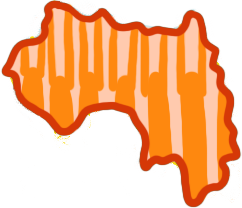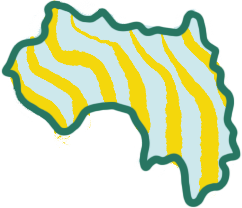Text
Earlier, we covered so-called qualitative verbs which allow us to describe things in sentences equivalent to "The house is tall" or "The town is big." But what happens if we want to say "the big town" or "a tall house"? In that case, we need to use adjectives!
In this chapter, I'll cover the following:
- pure adjectives
- adjectives derived from qualitative verbs
- adjective-like compounding
- irregular forms
- the augmentative and diminutive suffixes
-baand-nin
And finally, I'll briefly discuss when to use which one of these forms. An ka taa!
Pure adjectives
In Maninka, and Manding in general, there are words that are primarily adjectives. Such words can simply be placed right after the noun that they modify. Take, for instance, the adjective kuda ('new'); we could put it to use like this:
fen kuda
thing new'new thing'
A "noun phrase" like this one can be inserted into any kind of sentence. For instance, let's take another example like ɲaari fitinin ('little cat'):
Ɲaari fitinin ne
Cat little it's'It's a little cat'
(NOTE: You may also hear ɲankuma [or its Bambara/Jula cognate jakuma for 'cat'.)
What's important to know is that these words cannot be used like qualitative verbs (e.g., ɲi 'good') with the sentence structure SUBJECT + ka/man + QUAL. VERB that we learned earlier. For instance, we can say:
Ɲaari ka ɲi
'The cat is good'
But we cannot say:
Ɲaari ka fitinin
'The cat is small'
Qualitative verbs as adjectives
Some words act as adjectives but they originally come from qualitative verbs.
In these cases, they become adjectives by way of the suffix -man that we add to the end of the word.
For instance, let's take the qualitative verb ca ('numerous; abundant'). Imagine, for example, that it rained a bunch in a town you were visiting; in this case, you could say:
Ji ka siya
'Water is abundant'
(as in, 'There's a lot of water')
If we wanted to use siya as an adjective, however, then we would need to add -man:
ji siyaman
'abundant water'
(as in, 'a lot of water')
Note that you cannot use siya by itself as an adjective:
ji siya
'abundant water'
In some cases, you may notice a slight shift in pronunciation from the original qualitative verb. For instance:
ɲi → ɲi-man → ɲuman
'good'
(e.g., mɔbili ɲuman 'good car')
Or:
di → di-man → duman
'pleasing'
(e.g., damunni duman 'tasty food')
Here, it is worth noting that Maninka speakers (in contrast to Bambara/Jula-speakers) often opt to use adjectives derived instead of qualitative verbs.
For instance:
O duman (ne)
"That pleasant (it is)"
Instead of:
O ka di
"That is pleasant"
In such cases, speakers of Maninka will often not use the presentative copula le/ne at all. For instance:
O gbɛlɛnman
"That difficult"
Instead of:
O gbɛlɛnman ne
"That difficult it's"
(as in, "That is difficult")
Adjective-like compounding
Many qualitative verbs, however, can—as if they were adjectives—simply appear after a noun.
For instance, let's take the word gbɛlɛn ('difficult'). If we wanted to use it in qualitative verb sentence like those that we've already learned, we would do so like this:
Baara ka gbɛlɛn
'Work is difficult'
(as in, 'The work is difficult' or 'Work, in general, is difficult')
Conveniently, we can also use gbɛlɛn as if it were an adjective—that is, right next to the noun—without needing to make any changes to the word itself. For instance:
Baara gbɛlɛn
work difficult'difficult work'
Note how I wrote gbɛlɛn as a separate word following baara. This sometimes occurs in Latin-based Maninka (and Manding, in general), but it's actually a bit misleading. In reality, this kind of usage is arguably not a question of a noun and a separate adjective, but rather one new single word—a "compound word" combining a noun and a qualitative verb:
Baara-gbɛlɛn
'difficult-work'
From this perspective, Maninka is a bit like English, since we also write compounds in a variety of ways; take for instance "firetruck" (one word) and "light switch" (two words).
In any case, and without going into the nuances, what's important is that English language concepts such as "black car" can be expressed in one of two ways potentially:
mɔbili-fin (often written mobili fin)
'black-car'
Or:
mɔbili finman
'black car'
Irregular forms
In some cases the adjective form that corresponds with a particular qualitative verb (e.g., siyman for siya) may be irregular.
For instance, if we want to say the equivalent of "tall man"; we could express it one of two ways potentially; using the compound form:
kɛ-jan (often written kɛ jan)
'tall-man'
Or using the adjectival pair of jan, which we would assume to jan-man, but, in fact, is janmanjan:
kɛ janmanjan
'tall man'
Diminutive and augmentative suffixes
In addition to all that we've covered thus far, there are also two suffixes that can function in a way similar to adjectives: the diminutive suffix -nɛn and the augmentative suffix -ba.
(NOTE: The diminutive suffix can also appear as -nin in Maninka. This happens to be the same form used in Bambara/Jula.)
The diminutive suffix -nɛn attaches to a noun and, in essence, turns it into a "small" or "wee" version of what you are discussing. For instance:
den → dennɛn
'kid' → 'little kid'
The augmentative suffix -ba does the same thing, but in the other direction; it adds a value of "big" to whatever you are talking about. For instance:
so → soba
'town' → 'big town'
Interestingly, people will sometimes add the augmentative suffix onto an adjective (pure or derived). For instance:
So belebeleba le
"It is a big-big town"
(as in, "It's a really big town")
Or:
Moso ɲumanba le
"It's a good-big woman"
(as in, "She is a really good woman/person")
Which one to use?
At this point, you may be asking yourself, "How do I know when to use what form?" The short answer is that it's up to you!
As you learn Maninka (and Manding, in general), you'll notice regional tendencies to use one form more than another, but, in general, all of the forms I've laid out here are recognized and understood by everyone.
What's important for you is to learn the qualitative verbs and their adjectival equivalents, whether they are used regularly (using -man), irregularly (e.g., janmanjan 'tall'), or in compound words. From there, you'll be able to recognize and move between them just like native speakers would do in an exchange like this one:
– Conakry ka bon ba?
– Is Bamako big?– Ɔnhɔn, so belebele le.
– Yes, it's a big town.– Abidjan don?
– What about Abidjan?– Soba le fana.
– It's a big town too.
Summary
Ayiwa! We covered the following:
-
Adjectives appear following the noun that they modify. For instance:
Bon belebele tɛ.
'It's not a big house.' -
Some words are primarily adjectives (that is, they cannot be used as qualitative verbs via
ka/man). For instance:Bon ka belebele. -
Qualitative verbs can become adjectives via the suffix
-man. For instance:Maninkakan ka nɔɔ.
'Maninka is easy.'↓
Kan nɔɔman ne.
'It's an easy language.' -
Some qualitative verbs derive into irregular adjective forms. For instance:
Damunni ka di.
'(The) food is tasty.'↓
Damunni duman ye yan.
'There's tasty food here.' -
Some qualitative verbs can be used in a form of adjective-like compounding in which they appear directly after a noun without any modification. These are typically written as two words, but sometimes as one, or with a dash!
Baara ka gbɛlɛn!
'Work is hard!'↓
Baara gbɛlɛn ne!
'It's hard work!' -
The diminutive suffix
-nɛn('little') and the augmentative suffix-ba('big') can be used as the equivalents of adjectives. For instance:Silaba
'big road'Or:
Sonin
'little village' -
In general, there isn't a rule on when to use which kind of "adjectival" expression; you are free to use whichever one suits you and your friends best when chatting!
Vocab
Coming soon n'Ala sɔnna!
- kuda
- new
- fitinin
- little
- ɲuman [< ɲiman]
- good
- duman [< diman]
- pleasing; tasty; pleasant
- -nɛn/nin
- little; wee
- -dennɛn
- little; wee [lit. 'little kid']
- -ba
- big; large
- belebele
- big; large
- belebeleba
- big; large [lit. 'big-big']
- misɛn(man)
- thin; skinny; small
- jan (janmanjan)
- long; tall; far
- sudun(man)
- short; near
- juu(man)
- bad; mean; evil
- gboman
- displeasing; gross; unpleasant
- dɔɔman
- small; few; young
- siyaman
- abundant; numerous; a lot
- fisaman
- better
- kɛndɛ(man)
- healthy; fresh
- nɔɔman
- easy
- gbɛlɛn(man)
- difficult
- fin(man)
- black
- wulen(man)
- red; brown [Maninka/Jula]
- bilen(man)
- red; brown [Bambara]
- gbɛ(man)
- white; clean; pure [Maninka]
- jɛ(man)
- white; clean; pure [Bambara]
- koron
- worthless
Vocab list will be here someday!
Flashcards will be here someday!
Exercises
Exercises will be here someday!




